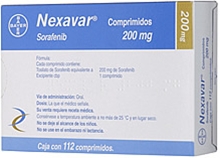|
In a move that could set the tone for future pharma patent battles, the country's intellectual property rights watchdog has granted Hyderabad-based NATCO Pharma compulsory licence for the manufacture of `Sorafenib Tosylate', the generic version of the branded drug `Nexavar', sold by Bayer Corporation.  Nexavar is the first-line treatment for liver and kidney cancer and the Controller General of Patents, Designs and Trademarks awarded the compulsory licence to Natco under the provisions of Section 84 of the Indian Patents Act, 1970. Nexavar is the first-line treatment for liver and kidney cancer and the Controller General of Patents, Designs and Trademarks awarded the compulsory licence to Natco under the provisions of Section 84 of the Indian Patents Act, 1970.
The compulsory licence, the first of its kind to be granted in India, enables Natco to sell the drug at a price not exceeding Rs8,880 for a pack of 120 tablets (one month's therapy) against Rs284,428 being the cost of Naxavar sold by Bayer. The licence is valid till the expiry of the patent in 2021, Natco said in a release today. The licensing is subject to certain conditions such as maintaining account of sales, and payment of royalty at 6 per cent of the net sales on a quarterly basis etc. The order also makes it obligatory for Natco to supply the drug free of cost to at least 600 needy and deserving patients per year. ''Natco welcomes this order and opines that this opens up a new avenue of availability of life savings drugs at an affordable price to the suffering masses in India,'' the release added. Governments allow compulsory licensing of certain patented drugs to someone else without the consent of the patent owner, in cases of extreme shortages or in cases where the drug becomes unaffordable. It is one of the flexibilities on patent protection included in the WTO's agreement on intellectual property - the Trade-Related Aspects of Intellectual Property Rights (TRIPS) Agreement. The Indian Patents Act allows such compulsory licence applications after three years of the grant of patent, if reasonable requirements of the public with respect to the patented invention have not been satisfied - the patented invention is not available to the public at a reasonably affordable price or if the patented invention has not worked in the territory of India. India had granted patent protection to Nexavar in 2008, enabling Natco to initiate compulsory licence proceedings three years later. Natco's plea for compulsory licence is that Bayer's patent-protected and imported medicine is highly priced -- and is available only in limited quantities through pharmacies attached to a few big hospitals in major cities. That makes it a fit case for compulsory licensing to trigger generic competition. Bayer had opposed Natco's application for compulsory licence and justified its high price as the cost of innovation. The company also argued that it has the right to determine what constitutes a ''reasonably affordable price''. According to Natco's submission, at least 100,000 people suffer from different types of renal cell carcinoma and hepatic cell carcinoma in India and 30,000 new patients are diagnosed each year with both these diseases and nearly 24,000 patients die every year in the country. Bayer, however, argued that the total number of patients requiring Sorafenib treatment in India was as low as 8,000. On the question of local working requirement in the territory of India, Bayer submitted that local working requirements in the Patents Act were directed towards ensuring that inventions were domestically worked -- that is, supplied to the Indian market. ''An attempt to impose local working requirements - in the sense of local manufacturing - on patents granted in India would be beyond the scope of the Patents Act and against the intent of the legislature,'' the MNC added. Bayer has also slapped patent infringement suits against Natco and Cipla for producing low-cost versions of Nexavar. India had introduced compulsory licensing provisions in the Patent Act amendments made in 2005. The government had never exercised the compulsory licensing provisions, though it had discussed the possibilities of allowing local manufacturing through compulsory licensing in the wake of bird flu epidemic threat nearly six years ago.
|